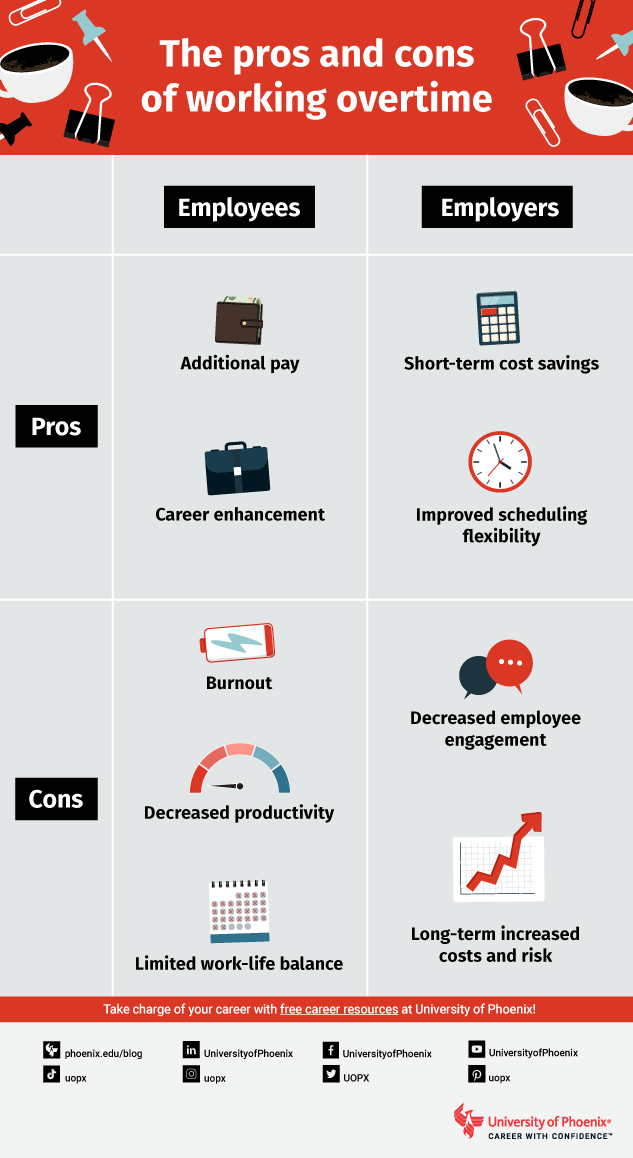Overtime: Is it worth the extra pay?
This article was updated on December 4, 2023.

Written by Kara Dennison, SPHR

Reviewed by Jessica Roper, MBA, director of Career Services at University of Phoenix

As an executive career coach and HR professional, I’ve worked with thousands of high achievers and leaders who are passionate about enhancing their careers. When career progression is at the forefront of a high achiever’s mind, it’s natural to volunteer for extra projects, work longer hours and stack overtime, all in an effort to gain additional skills and prove you’re capable of that next step.
But what happens to high achievers — and the companies they work — for when the costs of working overtime start to outweigh the benefits?
What is overtime pay?
Overtime pay compensates the hours an employee works beyond their regular working hours. Employers are required to pay “time and a half,” or one-and-a-half times the hourly rate, for any hour worked beyond the allotted 40 hours in a week, as long as the employee is in a non-exempt role.
Exempt vs. non-exempt
Non-exempt employees are those who are not prohibited from overtime pay. These employees are hourly workers whose jobs do not involve significant management or professional duties and must be paid at least minimum wage.
Exempt employees, or salaried employees, are managers, executives and professionals who have job duties that require them to use judgment and discretion while performing their roles. These employees are not eligible for overtime pay but may still work more than 40 hours per week based on job duties, demands of the company or professional growth opportunities.
The pros and cons of overtime for workers
Overtime can be a great way to increase your skills or earn extra money.
However, sustained periods of work without adequate rest can lead to some negative consequences. Here are some benefits and disadvantages to consider.
Advantages for employees
Some pros of overtime are:
- Additional pay: If you’re an hourly employee, one of the main benefits of overtime is racking up that extra cash. In some industries (such as manufacturing, construction, transportation or healthcare), working overtime may be necessary to meet deadlines.
- Career enhancement: By taking on extra projects, employees can develop new skills, collaborate with different teams and position themselves for a possible promotion. However, this approach to enhancing your career echoes an old way of thinking, namely that working harder or longer indicates superior work ethic. While there may be merit to this outlook, it is evolving to emphasize the importance of innovation, creativity and efficiency.
Disadvantages for employees
Some cons of overtime work are:
- Burnout: Working longer hours over an extended period can lead to burnout, which can negatively impact both physical and mental health. This could mean losing sleep, becoming irritable or losing focus. Sustained levels of stress and burnout have been linked to long-term physical ailments, such as migraines, depression and anxiety.
- Decreased productivity: Fatigue and stress can increase the risk of workplace accidents and errors, and needing to take time off. Time off from work can cause a cycle of constantly feeling behind, missing deadlines and maxing out PTO.
- Limited work-life balance: Working overtime can also limit an employee’s work-life balance. Additional time at work can lead to missed family or personal events, and it can be challenging to manage other responsibilities outside of work. This can breed resentment, increase feelings of isolation and damage relationships.
"Employees can no longer be viewed as capital, assets or resources. They are people."
The pros and cons of overtime for companies
At the end of the day, projects have to get done, client needs have to be answered and deadlines have to be met. Overtime can play a role in all of that.
Advantages for companies
Companies benefit from overtime in the following ways:
- Short-term cost savings: Hiring and training new employees can be expensive and time intensive. Offering overtime pay may be a more cost-effective option for short-term increases in workload.
- Improved scheduling flexibility: Overtime can provide employers with more scheduling flexibility as they can adjust staffing levels based on workload and production demands. This can help employers manage their workforce more efficiently and effectively to meet short-term deadlines.
Disadvantages for companies
Overtime isn’t all rainbows and unicorns for companies either. Some cons include:
- Decreased employee engagement: If overtime work is required on a regular basis, employees may become burned out and resentful of the additional hours, leading to reduced employee engagement and increased turnover.
- Increased costs and risk: Overtime work can also be expensive for employers. Not only is the overtime pay costly, but there are hidden costs to consider too. Hiring replacements or trying to reengage a disgruntled employee population are two examples. Another one may be increased health and wellness costs necessary for an unhealthy and burned-out workforce.
Employers may also face legal risks if they do not comply with overtime regulations. Failure to pay overtime or misclassifying employees can result in costly legal battles and reputational damage.
The generations in the workforce
With five generations now in the workforce, it’s important to zoom out and think about how we got here so we can know where we’re going.
Traditionalists and boomers were responsible for standing up the systems and organizations we currently find ourselves working in. These systems were born from survival (two World Wars and the Great Depression) and a value system that emphasized dependability and duty.
Decades later, with the rise of technology and an evolving culture, these systems don’t necessarily support the long-term goals and values of new generations. A 2022 study by EY, for example, revealed Gen Z and millennials care about the companies they dedicate their time and skills to as well as what their companies do to foster a culture that aligns with their values.
In fact, 39% of both millennial and Gen Z employees affirmed that culture greatly impacts their decision to stay at their current company, as opposed to 29% of boomers who said a company’s culture has little or no impact on their decision to stay.
The same study underscored the importance of other factors too. Flexibility, for example, is important: 29% of Gen X and 35% of millennials said they’d consider staying with their current companies if remote and hybrid options were offered.
Overtime: the great debate
So, what does all this have to do with overtime? The changing landscape of the workforce impacts everything from quiet quitting to where and how we work. That means overtime — and its implications — are up for reevaluation.
As I see it, employees can no longer be viewed as capital, assets or resources. They are people. People who want to be valued, heard, respected, fulfilled, aligned and invested in as much as they invest their time, energy and skills into their work.
I have both witnessed and experienced burnout. I put in long hours for the promise of a promotion that never came before I wised up and left. And I’ve seen numerous high achievers who felt pressured to work overtime but end up feeling jaded, undervalued and disengaged. If overtime happens on a long-term basis, these high achievers often leave for greener pastures where companies see their value and invest back into them holistically.
Overtime can be beneficial in the short run for non-exempt employees who need a financial boost and employers who need to meet short-term deadlines. However, overtime should be used only in moderation and in combination with initiatives that prioritize long-term sustainability and the growth and alignment of the individual within the organization. This can help ensure not only steady and sustained levels of productivity but also increased employee engagement and reduced turnover.
And that’s something that benefits everyone.
Read more articles like this:

ABOUT THE AUTHOR
Kara Dennison is a certified Senior Professional in Human Resources (SPHR), Executive Career & Leadership Coach and Forbes Contributor. She’s the CEO of Optimized Career Solutions and has helped over 2,000 high-achieving professionals and leaders land their dream jobs, helping to negotiate over $12M in salary increases. Her dream job is helping high achievers and leaders live authentic lives, starting with their careers. When she’s not writing for University of Phoenix or coaching high achievers and leaders, you can find her hanging out with her husband and two black cats or swinging in the hammock out back in her small, remote town in Tennessee.

ABOUT THE REVIEWER
Jessica Roper, University of Phoenix director of Career Services, is a seasoned leader with over 15 years of experience in leadership within higher education. She has honed her expertise in student services and career development and is passionate about helping others discover and refine their skills.
This article has been vetted by University of Phoenix's editorial advisory committee.
Read more about our editorial process.



